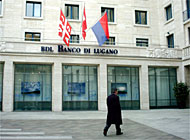Ticino strives for economic independence

Ticino's economy has long depended on northern Italy, particularly for labour. But the canton is trying hard to assert its economic independence by boosting industries such as tourism and technology.
Ticino’s dependence on northern Italy is most apparent in the tourist industry where almost 80 per cent of its employees are Italians, who commute across the border each day.
Without the Italian workers, says Ricco Maggi of Ticino’s Institute for Economic Research (IRE), “Ticino’s workforce would be too small to allow the canton to grow economically”.
Maggi is very upbeat about the canton’s economic prospects, despite the fact that it has one of the highest unemployment rates in Switzerland. “For the moment, everything is going really well,” he says.
He cites a recent influx of banking and capital investment as the main reason that Ticino is doing well financially. The city of Lugano has been one of the main beneficiaries of this investment and is Switzerland’s third most important economic centre.
Tourism, traditionally a mainstay of the canton’s economy, is also doing well, and a new Alpine transit project has provided another boost.
Despite the canton’s healthy economic situation, however, concerns persist that these industries are not enough to sustain the region or even make it remotely autonomous.
Economist and sociologist, Christian Marazzi, believes Ticino needs a long-term economic strategy that would put “local resources to use” and make the region less dependent on Italy.
“We are relying more and more on the northern Italian economy,” he says. “This means we’re always in the precarious situation of falling into a local recession depending on what the global economic powers decide to do with us.”
According to Marazzi, Ticino’s economic dependency on Italy, coupled with a long-standing fear of poverty and the lack of an industrial revolution, have driven the region to strive towards financial autonomy, without coming up with a local development strategy.
“We’ve entered into this complicated phase of globalisation without thinking about what’s good for us,” he says. “We’ve been obsessed with bringing in capital, in the forms of banks and casinos, while exploiting whatever is exploitable.”
Marazzi says Ticino’s politicians need to rethink their economic policies and focus on viable industries such as information and high technology.
“We have to invest in education and training – not just spend – but rethink our economic policy and foster an entrepreneurial spirit,” says Marazzi.
“We’ve never really industrialised Ticino,” he adds. “We’re always at the starting point without ever getting anywhere, but now we have the possibility to take a global step by building ourselves up through new forms of technology.”
The director of Ticino’s tourism office, Eugenio Foglia, also believes the canton needs to focus on the information and high technology sectors. He says Ticino has the potential to become a “little Silicon Valley”.
But IRE director, Ricco Maggi, says the region doesn’t have the kind of infrastructure needed to become a high-tech hot spot.
“There are people who dream of becoming a little Silicon Valley,” he says. “But I don’t think Ticino has the kind of critical mass necessary to create a hyper-dynamic, capitalistic environment which builds up new enterprises and destroys the old.”
According to Marazzi, though, the time has come for the Ticinese to take a new economic approach and accept a new way of thinking. As he sees it, the key to Ticino’s economic independence lies in acting locally while thinking globally.
“That’s our challenge: to be more autonomous – not in an isolationist sense – but to love our land and our country with an open, global and cosmopolitan spirit.”
by Anna Nelson, Lugano

In compliance with the JTI standards
More: SWI swissinfo.ch certified by the Journalism Trust Initiative
You can find an overview of ongoing debates with our journalists here. Please join us!
If you want to start a conversation about a topic raised in this article or want to report factual errors, email us at english@swissinfo.ch.